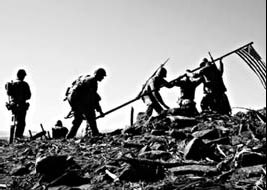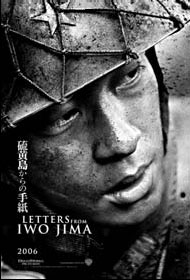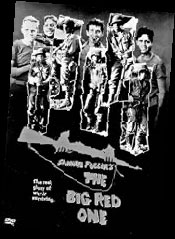Reviews: DVD
Flags of Our Fathers
Directed by Clint Eastwood, starring Ryan Phillippe, Jamie Bell
 This World War II epic recounts the bloody battle on Iwo Jima from the perspective of the American soldiers, detailing how the famous photograph was taken of the planting of the American flag. Like Kurosawa's Roshoman, it raises the question: What is truth?
This World War II epic recounts the bloody battle on Iwo Jima from the perspective of the American soldiers, detailing how the famous photograph was taken of the planting of the American flag. Like Kurosawa's Roshoman, it raises the question: What is truth?
With three stories running in parallel, the framework of the narrator, the son of one of the flag raisers and the author of the book that inspired the movie, is probably the weakest; the war itself is depicted in an impressionistic manner; the real emphasis is on the tour that the three surviving flag raisers were dragged away from the battlefront to help sell war bonds.
With restrained mastery, the filmmakers crafted a work of philosophical musing on the meaning of heroism. It suggests that who we identify as heroes are often no more than victims of circumstance. It is a stroke of genius that the movie manages to raise such questions while recognizing and honoring the sacrifices of the "greatest generation".
Raymond Zhou
Letters from Iwo Jima
Directed by Clint Eastwood, starring Ken Watanabe, Shido Nakamura
 This companion piece to Flags of Our Fathers depicts the same battle, but from the Japanese perspective. It is balanced, poignant and achingly humanistic.
This companion piece to Flags of Our Fathers depicts the same battle, but from the Japanese perspective. It is balanced, poignant and achingly humanistic.
The story is told from the letters written by a US-trained general and a low-ranking soldier. They may not be typical because each retains sentiments that were not suppressed by Japan's war propaganda. Their inner conflicts between loyalty to their country and doing "what's right" such as the basic instinct of survival probe into a disturbing corner of our psyche.
The movie is bleached of bright colors, except in the opening scene set in 2005. The stark environment symbolizes the brainwashed world of the soldiers' minds. Any flash of humanity seems so feeble, yet powerfully emotional. The scenes where a Japanese officer reads out a letter of a dead American soldier and where another Japanese soldier is punished for sparing a civilian's dog are harrowing.
RZ
The Big Red One
Directed by Samuel Fuller, starring Lee Marvin, Mark Hamill
 The casting of Lee Marvin should give it away. This isn't a war movie that has its characters wax lyrical on existentialism. This is not to say that The Big Red One avoids big questions but they are alluded to rather than discussed. It is more reminiscent of a veteran's campfire tales than a director's commentary on national ideologies.
The casting of Lee Marvin should give it away. This isn't a war movie that has its characters wax lyrical on existentialism. This is not to say that The Big Red One avoids big questions but they are alluded to rather than discussed. It is more reminiscent of a veteran's campfire tales than a director's commentary on national ideologies.
The title refers to the number worn on the sleeves of the US first infantry division. We see campaigns in North Africa and Europe including the D-Day invasion and a raid on the Falkenau concentration camp. There is a simplicity in the way that death is portrayed which lends these sequences a solemnity that some war films lack due to their habit of persistently pushing the buttons of an audience.
Amid the carnage, the troops maintain a steely resolve albeit for a few moments where composure is momentarily lost. Still, it is testament to this great film that it does not dwell on these moments of vulnerability.
Ben Davey
(China Daily 02/28/2007 page20)














